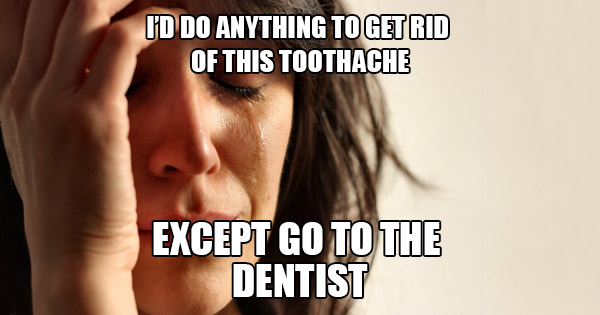Toothaches happen. Sometimes they’re a symptom of a much bigger problem. Other times, they’re temporary and will go away either on their own or with minimal intervention. How can you tell the difference between the two? Here are a few ways to evaluate it:
Is it sensitive to hot or cold?
When you get a toothache, try drinking something hot like a cup of tea or something cold like a glass of ice water. If you notice extra sensitivity in one specific tooth, teeth or area of your mouth, it might be best to let your dentist examine the situation.
Is it keeping you up at night?
Like anything else, if the pain is preventing you from falling asleep or even lying on one side of your face, it’s worth having a dentist look at it.
Is there swelling?
If you notice redness in your face and along your gum line, this could be a sign of infection that won’t go away without treatment.
Does your face appear larger on one side?
When you look in the mirror and notice that the side of your face with the pain is starting to look different, this can lead to much more serious problems that may need more than a dentist to solve if left untreated.
Does it bother you for no good reason?
Discomfort in a tooth without a stimulating factor, or spontaneous pain, is usually a sign of a more significant issue and it is best to have your tooth examined.
Do you notice a foul taste in your mouth?
This can be a preliminary sign of infection or rotting and it’s important that you come in to see us, as this could begin affecting your gums and lead to larger periodontal problems.
Do you see a hole?
Take a hand mirror and examine your aching tooth carefully. If it’s one that was previously worked on by a dentist, the pain may be as simple as a loose or missing filling. This is an easy problem to solve, but it needs to be dealt with immediately, lest you risk further damage to the tooth.
What now?
The first thing you should do is book an appointment to see us. It’s most likely a very solvable problem, and the earlier we catch it, the better off you’ll be. While you wait to see us, keep your mouth as clean as possible and rinse daily with salt water. Most discomfort can be managed with over-the-counter medications like Tylenol or Advil but check with your dentist, doctor, or pharmacist to see which medication is suitable for you.
If you have any questions in the days before you come in, feel free to give us a call any time at 416-932-2222.








